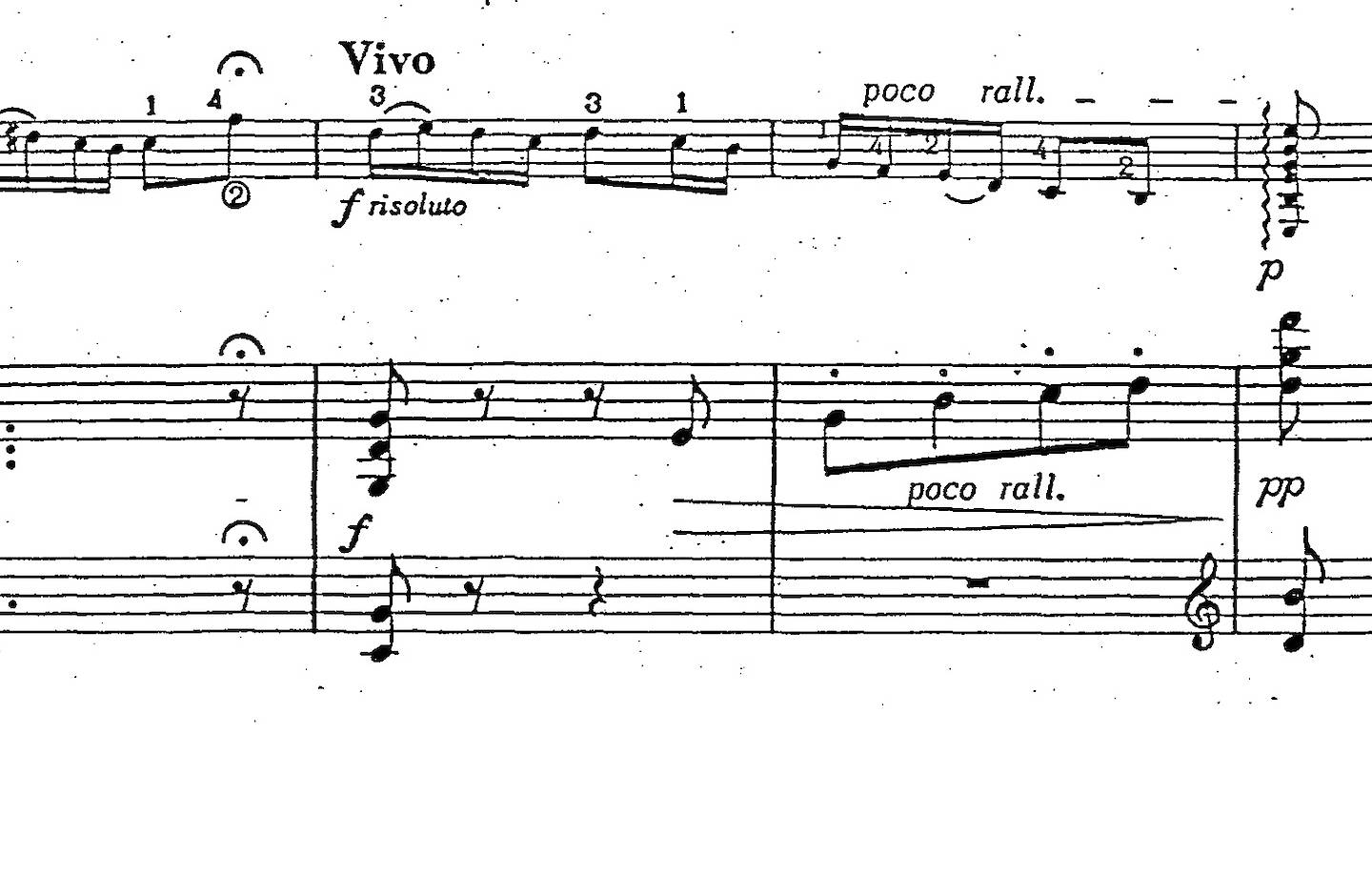Jazz Endings in Ponce
During the Cold War we called Ponce's endings, "jazz endings".
This sonata proves Ponce's set class consciousness definitively.
This is the ending of the last movement, the third movement.
 Arriving at major I is enriched by the set class (aka *chord quality*) arrival on that most shiny of trichords 045 or 015. Here that is embedded in a 0158, but with an interesting allocation of components amongst the two instruments. The harpsichord sounds G# minor, the guitar does E major. The arrival at the 2nd theme in the first movement is an arrival on a Bmaj7/F#. Leading up to the arrival, the guitar lands on a 2nd inversion B major chord, with the harpsichord arpeggiating G# minor, highlighting the symmetrical 0158 as a unity of two trichords that are inversions of one another.
Arriving at major I is enriched by the set class (aka *chord quality*) arrival on that most shiny of trichords 045 or 015. Here that is embedded in a 0158, but with an interesting allocation of components amongst the two instruments. The harpsichord sounds G# minor, the guitar does E major. The arrival at the 2nd theme in the first movement is an arrival on a Bmaj7/F#. Leading up to the arrival, the guitar lands on a 2nd inversion B major chord, with the harpsichord arpeggiating G# minor, highlighting the symmetrical 0158 as a unity of two trichords that are inversions of one another.
The second theme of the first movement does what a Romantic sonata does -- delivers a trasnsposition up a 5th, the opening measure, up a fifth. All the pre-deminant and dominant proceedings are also there. Bmaj7/F#, the 6/4 chord is indeed followeed by a V, marked by the guitar strumming -- the strumming on B dominant 9th chord embellished by D dominant 9 chord -- a feint toward G major, but not really. This is more like Debussy's moving dominant 9 chords around by whole steps. Ponce shoves his B dominant 9 chord by a minor third. Debussy & Ravel moved their dominant 9 chords by even numbers, extending the whole tone scale. Ponce maximizes semitone relations to the locally focal B dominant 9. Both ways preserve dominant 9 as the chord quality of the moment, which is the V moment.
After the dominant 9 strumming there is much music before the definitive return of the opening measure, transposed up a 5th. This is a demonstration of Boulanger principle, that the 6/4 chord has great range.
The exposition is set class (chord quality_ usurpation of sonata form or binary form expectations.
Here, alk usurpations are *picaresque*, evident in the instrumentation and confirmed in the Segovia-Ponce letters.
Clearly, Ponce, but no doubt, Boulanger also, were all over set class unfoldings (aka "chord quality stories") in counterpoint to the transpositional unfoldings no less than Schoenberg's dazzling and exhaustive treatment of that in op. 9. Odd that Robert Levin never touched on this in his theory classes.
That the Ponce ending feels like a jazz ending shows that wonderful contact between jazz musicians and composers in Paris.
Coltrane's Favorite Things is
minor 7 ----> major 7
All this, once again, to help overcome the Taruskin confusion --
NO to Schoenberg
YES to Sibelius
In honor of Taruskin, I'll start studying Sibelius scores for evidence of set class consciousness. Clearly there is attention to modes, as seen in Ponce and Shostakovitch. But Ponce, more than Sibelius or Shostakovich, has convinced me of his consciousness of the set class *signatures* of modal phenomena. I need to really dig into to Sibelius & Shostakovitch to see if I am being unfair*. (*see below)
My point is Schoenberg was never a defector. Schoenberg and Boulanger were, from this 21st C. vantage point **allies**. And I remember Schoenberg's admiration for Debussy, although I don't remember where that's documented.
**"Schoenberg" is the wrong synecdoche.** And brace yourself: Babbitt is the wrong synecdoche; he called himself a Schoenbergite, and I am now pretty clear on what that means -- he did Boulanger things, but in a highly idiosyncratic way. I own that his way was problematic, likely it's fair to say that like Schoenberg he was over-ambitious, but also like Schoenberg he was *conservative*.
Babbitt and Schoenberg are hated for the wrong reasons.
The horrors began with "equal weight" and "Schoenberg is a Romantic in wolf clothing".
Schoenberg is being targeted as the one to hate. See the fatuous argument parroted in *Postmodernism or The Cultural Logic of Late Capitalism*. I tossed the book across the room in disgust. Too bad, because his arguments about postmodernism and late capitalism were looking good.
Back to the music:
It takes one to know one. I am musically conservative and what I hope to salvage from the wreckage is *accumulation*. I think I adopted that word from the Éminence Grise. Ponce's prolongations build tension, mark a trail of perceptible developments unfolding over long time spans, longer than anything possible in the "atonal free improv" that comes from the equal weight orientation.
////////////////
*Leon Botstein introduced me to cellist Robert Martin by saying he is one of those modernist snobs who likes to dislike Shostakovitch. Mr. Botstein was sure that would endear me to him. I am not in that club, but its Shostakovitch's happiness to stay in an octotonic prolangation for great lengths that would tempt one to be dismissive. My last impression was the Horszowski Trio's brilliant Shostakovitch for The Village Trip. I was thrilled with the piece and the perfomance. It's so much more wonderful than 21st octotonic drivel.
It's the last piece in this program:
https://www.youtube.com/watch?v=Qnr7bHXoyCE
This video will be chopped up more conveniently *soon*.

